Chocolate Lab – Your Guide To The Chocolate Labrador Retriever
The Chocolate Lab is a friendly, confident and loving dog with great character and huge appeal as a pet. You may have heard rumors that chocolate labs are less intelligent and more prone to health problems than their yellow and black Lab cousins. So we’ll be clearing up a few myths, and finding out if there is more to the chocolate Lab than just fur color!
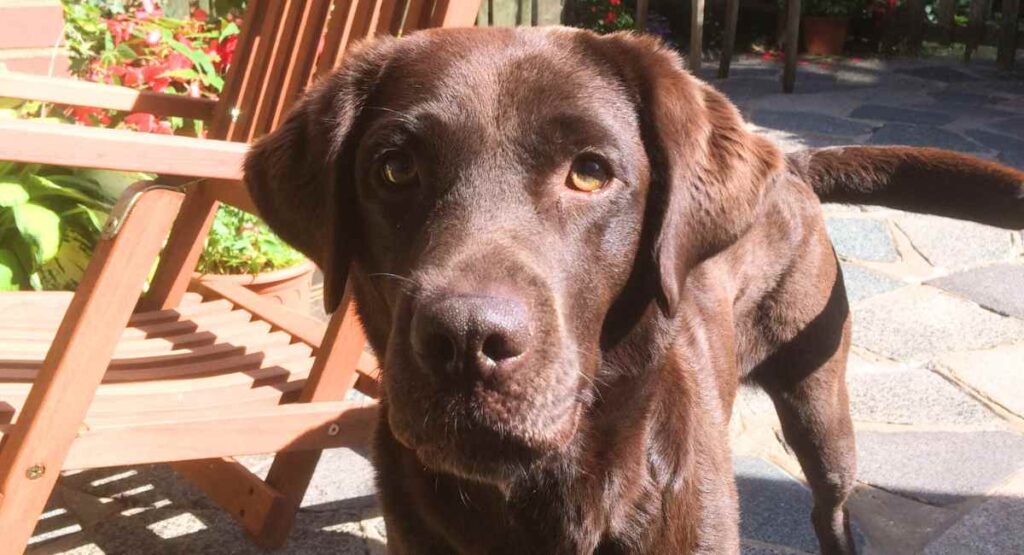
- Where did chocolate Labs come from?
- Coat color, shades, and easy genetics
- English vs American chocolate Labs
- Traits: What to expect from your chocolate Lab
- Are chocolate Labs stupid?
- Silver vs chocolate Labs
- Finding Chocolate Labrador puppies
- Chocolate Lab training
- Old chocolate Labs
I’ll share my experience of raising and training chocolate Labradors. We’ll look at what you can expect in terms of temperament, behavior, and physical characteristics. And I’ll help you with feeding and training your dog, from puppyhood to old age.
Where do Chocolate Labs come from?
Labrador Retrievers were recognised by the UK Kennel Club in 1903 and by the AKC in 1917. The Labrador breed was developed mainly by a couple of English aristocrats in the 1800s, from dogs they had imported from North America.

Although our early Labrador Retrievers were predominantly black, throughout the history of the breed, chocolate Labrador dogs (sometimes referred to as liver Labradors) have appeared occasionally in litters of puppies.
Way back in the last century, chocolate puppies were sometimes culled at birth! Black Labs were adored, and black was the only color considered respectable for a Labrador.
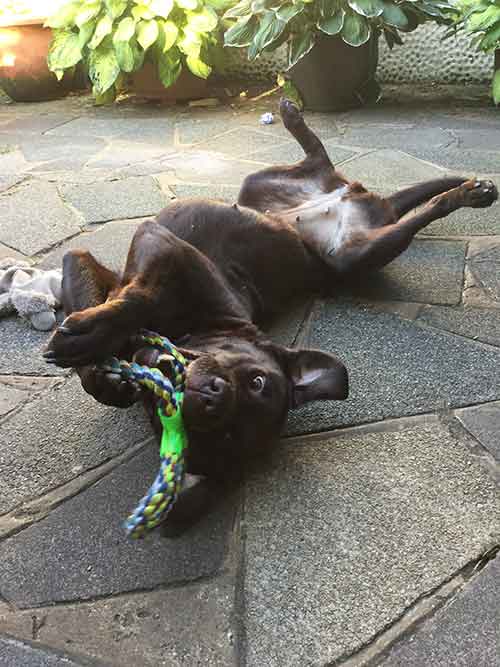
Fortunately those attitudes are well and truly behind us, and in the last few decades the chocolate Lab has gone from strength to strength.
How is the Chocolate Color Inherited in Labradors?
To understand how brown puppies can be born to two black dogs, we need to take a peep at how coat color is inherited in the Labrador retriever.
The instructions that tell your dog what to look like, and what color to be, come packed in genes. And genes come in pairs. This is true for the gene that determines whether or not the Labrador will be brown (this gene is called b) or black (B). Every Labrador has either two genes for a black coat (BB) or two genes for a brown coat (bb) or one of each (Bb).

The color black in Labradors is dominant. That means that if a Labrador has one gene for the color brown, and one gene for the color black, the dog will be black.
The hidden gene
This is because the black gene switches off the brown one. The brown gene remains hidden, doing nothing in particular, while the black gene takes control of fur color.
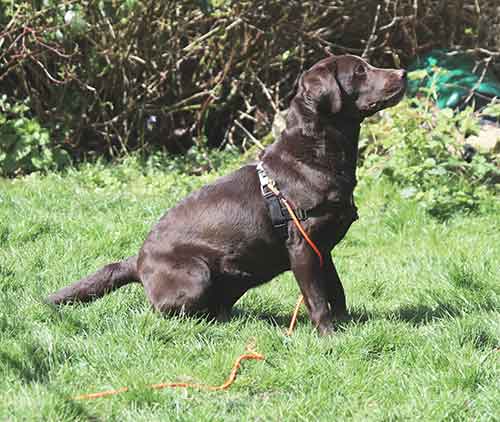
The brown gene only gets to be in charge if it is paired with another brown gene. But a black Labrador can sneakily carry a brown gene (Bb) and pass it along to his children. This is how the color brown can remain hidden in generation after generation of black Labradors.
Chocolate Labrador Shades
Unlike our yellow Labradors – which come in a wide range of shades, the color chocolate is pretty consistent in puppyhood. Most chocolate Labs are quite similar in color, though eye color can vary from gold to dark brown.
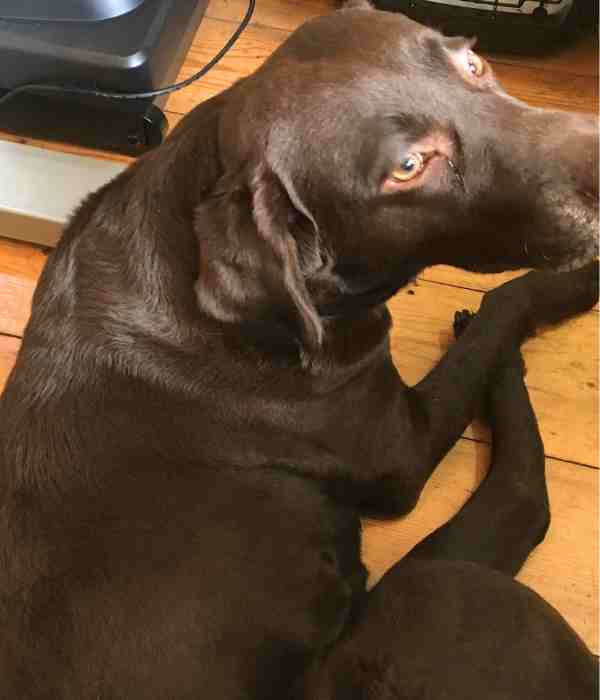
The color of your adult chocolate Labrador Retriever boy or girl’s coat will, however, vary depending on whether the coat is newly grown after a molt, or is about to shed. As the old hair dies it starts to lose some of its color, and the dead hair is much paler than the glossy dark chestnut-colored coat that will soon appear.
And though some chocolate Labs are darker than others, even when taking the stage of molt into account, variations between individuals are fairly small, with one very contentious exception. The Silver Labrador, which is a variation of the chocolate fur color. We’ll be looking a bit more closely at that below.
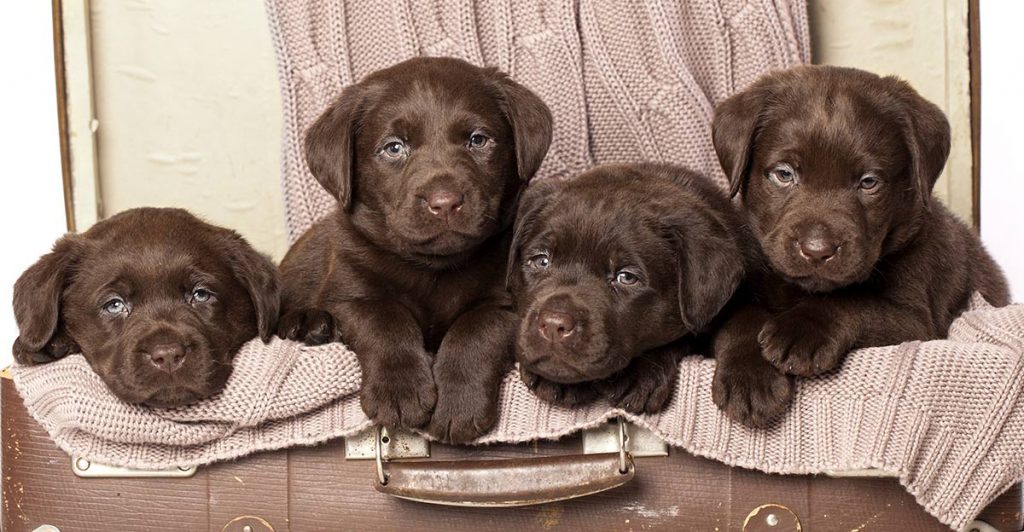
When did Chocolate Labs become Popular?
By the 1920s and 30s a few brown or liver Labradors, as they were then called, were making an appearance on the shooting field. But for some years more, brown was not widely acceptable to Labrador enthusiasts. It wasn’t until the 1960s that brown Labs began to really grow in popularity.
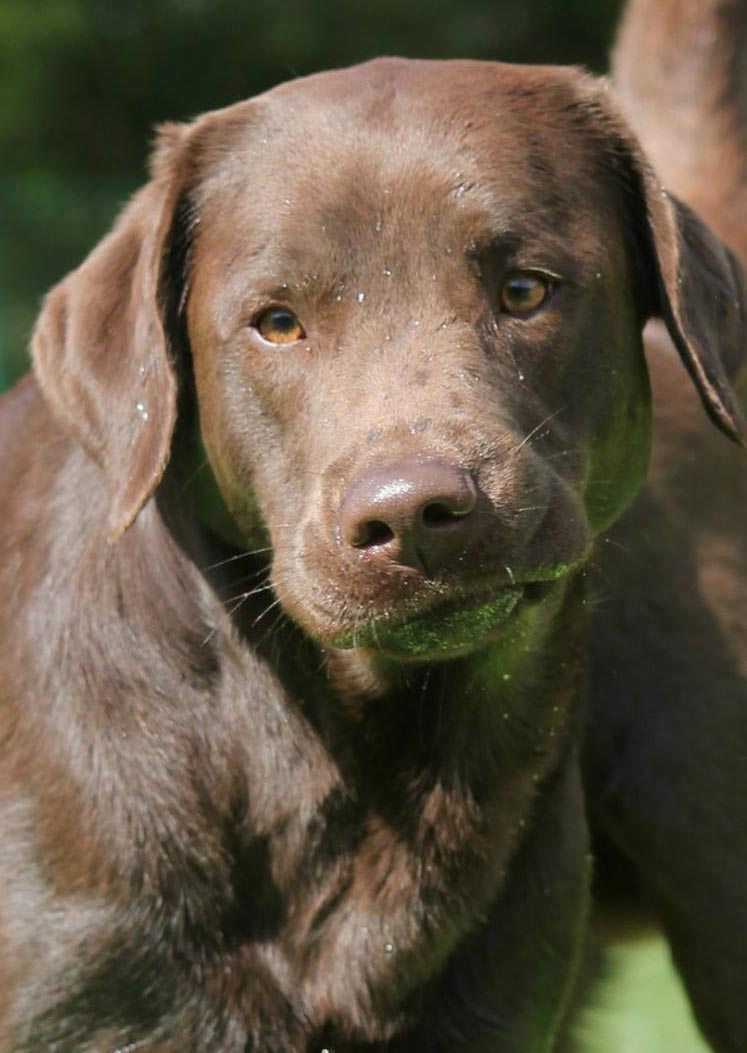
The demand for these beautiful dogs came from ordinary home owners and they much preferred the word ‘chocolate’ to describe their companions.
That preference continues today, and we often name our brown Labs after favorite snack bars and chocolate flavored drinks! You can however still register chocolate Labradors as ‘liver’ in color.
Different Types Of Chocolate Lab
As the popularity of Labs began to expand beyond the shooting community that developed the breed, they began to split into two different types. Those dogs mainly bred for show and companionship. And dogs mainly bred for hunting and retrieving.
English Chocolate Lab
English Labs are those bred for Shows. The first chocolate English Show Champion Labrador Retriever was Cookridge Tango in 1964. The 1960s was a turning point in the popularity of the chocolate Lab, but interest grew slowly at first.
Gradually, the public began to demand more chocolate Lab puppies, and breeders began to produce them. Over the next few decades, Chocolate Labradors became increasingly popular both in the show ring and as pets. In the shooting community, where Labradors were expected to do a job of work, the preference for black continued throughout the late 1900s, and into the present day, particularly in the UK.
American Chocolate Lab
American chocolate Labradors were bred to work, and are also known as field Labradors. The chocolate Lab has now become more established in the working community, but they are harder to find. There is a rumour going around that this is because brown Labradors are a bit stupid! We’ll look at that below.
 Chocolate Lab Characteristics
Chocolate Lab Characteristics
The split that occurred between show lines and working lines of Labrador, affected different colors of Labrador in different ways.
The black Lab remained the popular choice of the hunting fraternity, while the popularity of the chocolate Lab took off largely outside of the hunting community. And the traits or characteristics of chocolate Labs reflect their primary role as pets or companion dogs. As a result there are differences not only in temperament, but also in size and shape.
How Big Do Full Grown Chocolate Labs Get?
Show Labradors (English) are more heavily built, somewhat slower, and physically less agile than their field bred counterparts. Some English brown Labs may reach 80 or 90lbs without being fat or overweight. Whereas American chocolate Labs are often lighter.
My Lab Rachael, for example, weighs less than 60lbs. Most males of her build will weigh five or ten pounds more. English chocolate Labs are also more likely to have a chunky Labrador head and thick otter tail. And while some feel that the chunkiness of the skull has been taken too far in show lines, there is no denying the beauty of a classic Labrador head.
Show Labs also have smaller ears and a wider muzzle. A brown Labrador is more likely to be from these show types of bloodline and are therefore more likely to share these general characteristics. But there is more. It isn’t just body shape that is inherited.

Chocolate Lab Temperament
American Labs may have a more intense retrieve drive, or urge to chase and retrieve things than their show bred cousins. They also tend to be not only physically faster and racily built, but more ‘sensitive’ and responsive to training.
Field bred Labs tend to be quite dependent on their handler’s approval. In short, they are desperate to please. Over many generations this biddable quality has been bred into our working Labs alongside their retrieving and hunting prowess. This has given working dogs a rather different temperament from our show stock.
Chocolate Lab Intelligence
In show dogs you may see a more robust temperament. An English chocolate Lab is often less concerned over the little ups and downs of life. It’s all a bit of fun. Nothing is taken too seriously. Many English chocolate Lab owners report that their dogs are especially playful. And I have certainly found that to be the case with Rachael. She adores soft toys and spends hours playing with her Flat Squirrel!
The more serious nature of the American chocolate Lab doesn’t necessarily mean that field bred labs are more clever. However, they may less distractible, more focused and therefore easier to train. This can certainly give the impression of a dog that is pretty smart. These dogs may also be more likely to be black.
The important thing to remember is that these differences in ‘trainability’ if you like to call them that, are minimal. English Labs are still highly intelligent, highly trainable dogs. The differences between field and show might give you the edge in competition. However, they are not going to make any difference to your dog’s basic obedience training, or your pet’s behavior.
They are also becoming increasingly irrelevant as we switch to more modern methods of training which are much better at motivating dogs to engage in the training process. Now let’s find out why working retrievers are not usually brown.
Any color as long as it’s black!
We mentioned earlier that the color black has long been favoured by the working retriever community. Experienced, working gundog enthusiasts are less likely to buy a puppy that is not from working lines, and when they do, they are more likely to choose a black dog. Unsurprisingly this means that most working lines of Labs are predominantly black.
Black is also a great color for a hunting companion. A yellow dog really stands out in the countryside, even in poor light, so even when yellow dogs became more common, they were not so popular with the hunter. Brown dogs are better camouflaged but became more numerous much later and were embraced first by the pet and show communities.
Are Chocolate Labs Stupid?
To my knowledge, no study has ever been carried out on the differing intellectual abilities of Labrador of different colors. Everything you hear is based on personal anecdotal stories, often passed along in fun. At least to begin with! I found my own female chocolate Labrador from mixed lines to be a lot more ‘playful’ and interested in other dogs, than my working bred Labradors generally are.
She had very intense retrieve drive, but was less naturally keen to share the outcome with anyone. She was also easily distracted and because of this she took me a little longer to train than my working line Labs. I’ve heard others report the same observations. But it is most unlikely that there is any distinct difference in intelligence between dogs of the same breed that happen to be a different color.
Being chocolate does not make a dog stupid
Even if there were a difference in learning ability between different colored dogs, it does not mean that one caused the other. The answer lies in the behavior and temperament of dogs from different bloodlines.
Fashion
The difference in trainability is in short a feature of the difference between the field bred dog and the show bred dog. Not a feature of the color of the dog. And choice of color was originally down to fashion.
Ulitmately it is a coincidence that many chocolate Labradors are English in type, and many black Labs are American in type. Because of this coincidence the characteristics of the show bred Lab tend to be attributed to our brown friends. While the characteristics of the field bred Lab tend to be attributed to our black dogs.
So you can see how the myth got started. The fact is, that chocolate Labs from working lines are just as easy to train as black Labs from working lines. But you are less likely to meet a chocolate Lab from working lines at the moment.
Rest assured, your chocolate friend is not stupid. With modern training methods you can easily teach them to be a well behaved and obedient dog.
Silver Labs Are Chocolate Labs
Silver Labradors have a gene which dilutes the color chocolate and makes it a pale, silvery shade. Some people find this very attractive, while others regard it as an abomination. How the coat dilution gene got into our Labrador Retrievers is a matter for debate. Many believe that this gene has appeared quite recently.
One theory is that the gene arrived through cross breeding a Labrador with a dog that carries the dilute coat color gene. A breed such as the Weimaraner for example. Another explanation is that the gene causing the silver coat was some kind of genetic ‘accident’ or mutation. This seems rather less likely. The AKC is currently willing to register silver Labs, despite the dispute over their ancestry, but they can only be registered as ‘chocolate’. Not as silver itself.
A bright Future for the Chocolate Lab
Throughout history, there have been a number of famous black Labradors, and we tend to associate yellow Labs with the all important role of working as assistance dogs. Bill Clinton’s chocolate Labrador Buddy was famous simply for being the president’s dog, but it is harder to find examples of chocolate Labradors who have distinguished themselves.
This is not because chocolate Lab dogs lack the qualities or abilities of black and yellow dogs, but simply because the popularity of the color is a relatively recent phenomenon. There are as we speak, plenty of chocolate Labradors serving in the military, working as assistance dogs and in the shooting field. Their story has only just begun, and as time goes on, we’ll be hearing more of their exploits.
How to Find A Chocolate Lab
There are two main ways of bringing a chocolate Labrador retriever into your life. And many people will tell you that the very best way, is to rescue a dog from a shelter or dog’s home. The other way, is to buy a chocolate Lab puppy and raise them yourself. If you want to go the puppy route, then you’ll find my book Choosing The Perfect Puppy(paid link) a helpful guide. There are pros and cons to both rescuing an older dog and raising your own puppy, I go into these in some detail in The Labrador Handbook(paid link).
(paid link)It may well depend on what stage of life your family is at and on how experienced you are with dogs in general, and with Labradors in particular. If rescuing appeals to you, and you are ready for the challenges and the many benefits of giving a dog a new lease of life, there are plenty of rescue societies that specialise in Labradors.
Rescuing a Chocolate Labrador
The first step is to make contact with your local Labrador Rescue. Most rescues don’t rehome dogs outside their own ‘catchment area’. Rescuing can be a wonderful and fulfilling way of bringing a lovely brown retriever into your life, so do consider it thoroughly. You can find lots more information here: Labrador Rescue and Rehoming and here Bringing Home A Rescue Dog.
If now is not the right time for you to rescue an older dog. Or if you are getting a Labrador for a special purpose – as a hunting companion for example – you may be better off with a new puppy.
Buying a Chocolate Lab Puppy
Chocolate Labrador puppies are ready to go to their permanent homes at around eight weeks old. If someone wants to sell you a puppy much younger than that, alarm bells should be ringing. You also need to make sure you buy your puppy from the right place.
This means choosing the right breeder. And avoiding puppy mills and pet stores. If you want a puppy for hunting, you need to go to a breeder that specialises in field-bred dogs. If you want to get involved in the world of showing, go to a breeder that breeds Labradors for the show ring. It is possible to train a show dog for work, though he or she is unlikely to get far in high level competitions. But it is not normally possible to succeed in the show ring with a field bred dog. Their body shape and structure is too different. Keep this in mind.
Chocolate Labrador Puppy Health
Labradors of all colors suffer from inherited disorders. Do make sure your puppy is from health tested parents. Their parents should have good hip scores, good elbow scores, clear eye tests and be PRA clear too.
If your puppy’s parents are in good health, you increase the odds for your puppy.
Are Chocolate Labs Less Healthy?
In 2018 a study hit the headlines hard, and had a lot of chocolate Lab owners in a panic. Their research suggested that there is a link between Lab color and not just health, but lifespan too. Over 33,000 Labs were studied, with 23.8% of them chocolate. Giving a good sample size.
Chocolate Labs in the study were more likely to have dermatitis, which matches with some anecdotal reports from owners of silver Labs with skin problems.
Ear problems are also more common, and this is in fact something Rachael suffered with. Gastrointestinal issues were more common with chocolate Labradors too.
Chocolate Labradors live on average for just 10.7 years, where yellow and black Labs come out at 12.1 years. Interestingly, they were least likely to have degenerative joint disease or dental problems.
Avoiding Health Problems in Chocolate Labs
Health testing is important for any puppy buyer. But it is also important to look at the coefficient of inbreeding. Chocolate Labs get their color from a recessive gene. This means that to ensure you have a litter of chocolate puppies you need to breed from two chocolate parents. This limits your options further than the average breeder who isn’t interested in the color of their puppies. Reducing gene pools will tend to increase health problems.
Finding a puppy with a very low coefficient of inbreeding will help you to avoid some of these problems. In addition to health testing, it would also be sensible to avoid a chocolate Lab puppy with parents that have a history of ear or skin problems.
You can find out more about health issues in Labradors in this article: Health screening for Labrador Diseases. And there is lots of information on finding a good breeder here: Labrador breeders – how to find a good one
Training and Exercising your Chocolate Labrador
My advice for training your chocolate Labrador is to follow a good positive reinforcement training program. Make sure you exercise your dog’s mind as well as their body. Even if you never intend to take them hunting, every Lab needs a job to do, this can be as simple as finding toys and carrying out simple retrieves.
Training is important but its also fun. If your dog is from show lines, they too will need training and plenty of exercise, but they may also need plenty of play. Toys and games, and other dogs to interact with.
Training my Chocolate Lab
Even as an old dog, Rachael still loved to play with other dogs and with people. She was hugely enthusiastic about meeting people (and dogs) and prone to be a little over-friendly.
I therefore had to spend a bit more time ‘proofing’ basic obedience than I would with one of my yellow or black American Labs. And I had to make a special effort to ensure that she is not allowed to interact with visitors until she was sitting calmly. You may find you have to do the same with your dog.
On the plus side, I had to spend less time socializing Rachael than I would have with a field bred lab. As she took everything in her stride.
Caring for an old Chocolate Lab
Elderly chocolate Labradors are particularly beautiful, with their greying muzzles and kind eyes. As the years pass by, we leave behind one set of challenges and they are replaced by new ones. Failing eyesight, stiff joints, and declining hearing. However, these senior years can still be happy and fun filled for many dogs, especially if you keep your dog slim.
If your chocolate friend is heavily built as many chocolates are, you need to be extra careful to keep an eye on his weight as he ages. More weight means more stress and strain on joints, this can aggravate problems like arthritis.
Keep walking your senior dog for as long as they are enjoying their daily exercise. Of course, you will want to make your old friend as comfortable as you can, so go ahead and indulge them with cosy blankets, a nice orthopaedic mattress or a special place on your sofa.
I’d love to hear about your own chocolate Lab, so do drop your story in the comments box below. Tell us what is so special about your chocolate Labrador and why you think they are the best.

Free Labrador Updates!
Get my training tips, news, reviews, and the latest from The Labrador Site delivered to your inbox

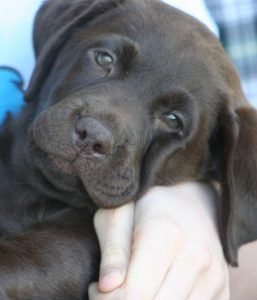
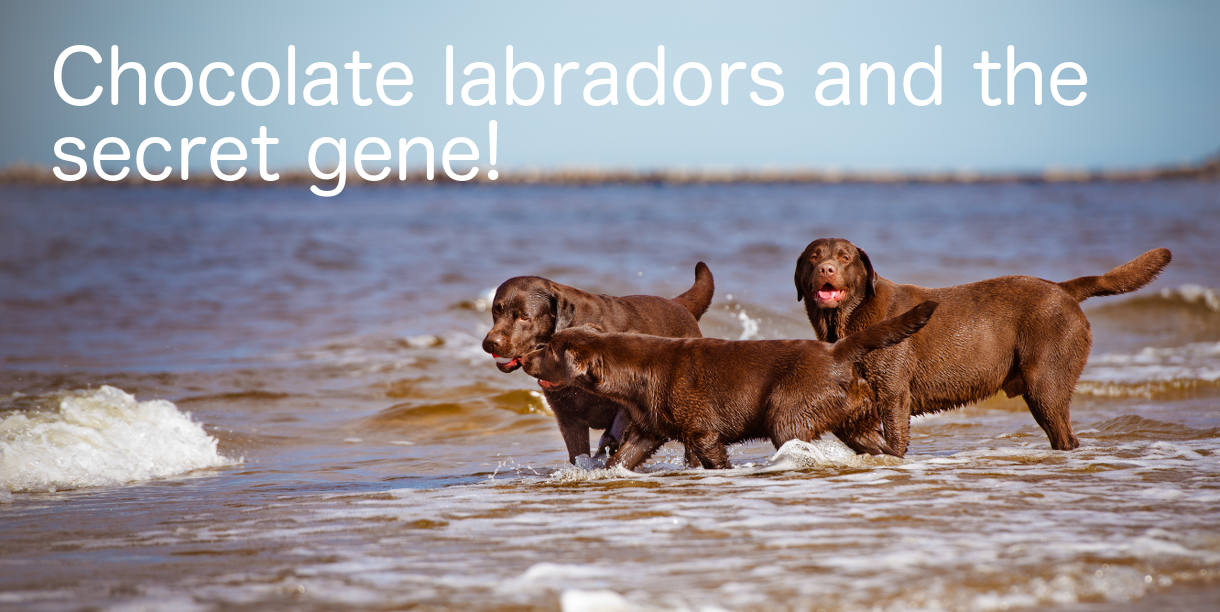
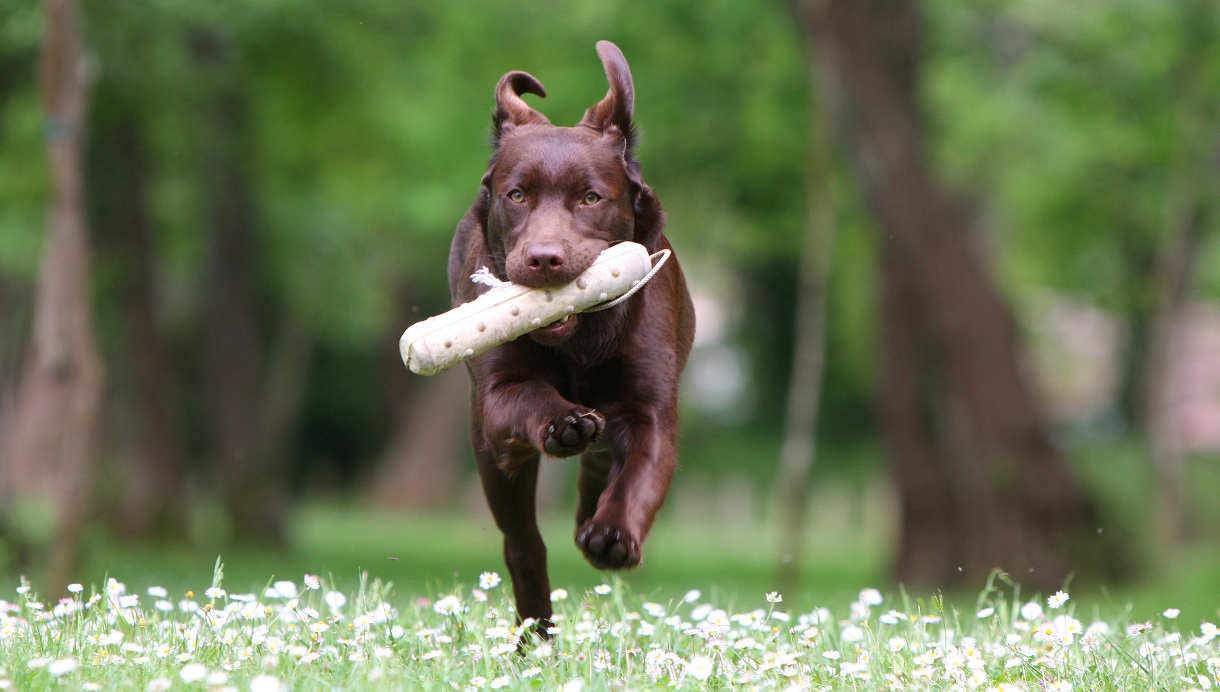
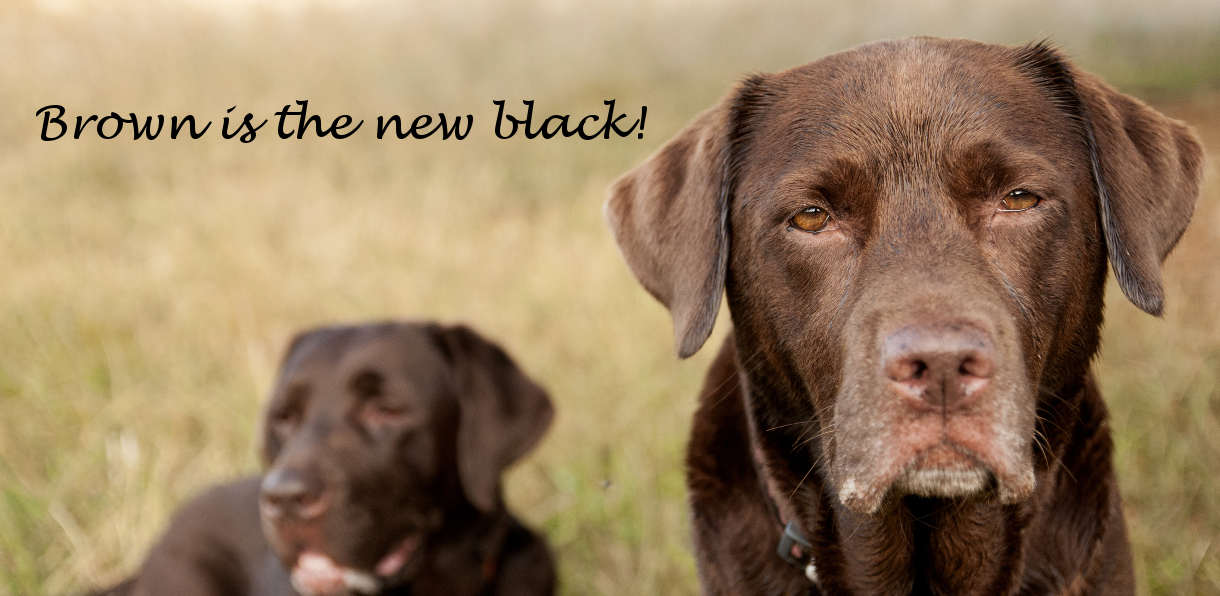

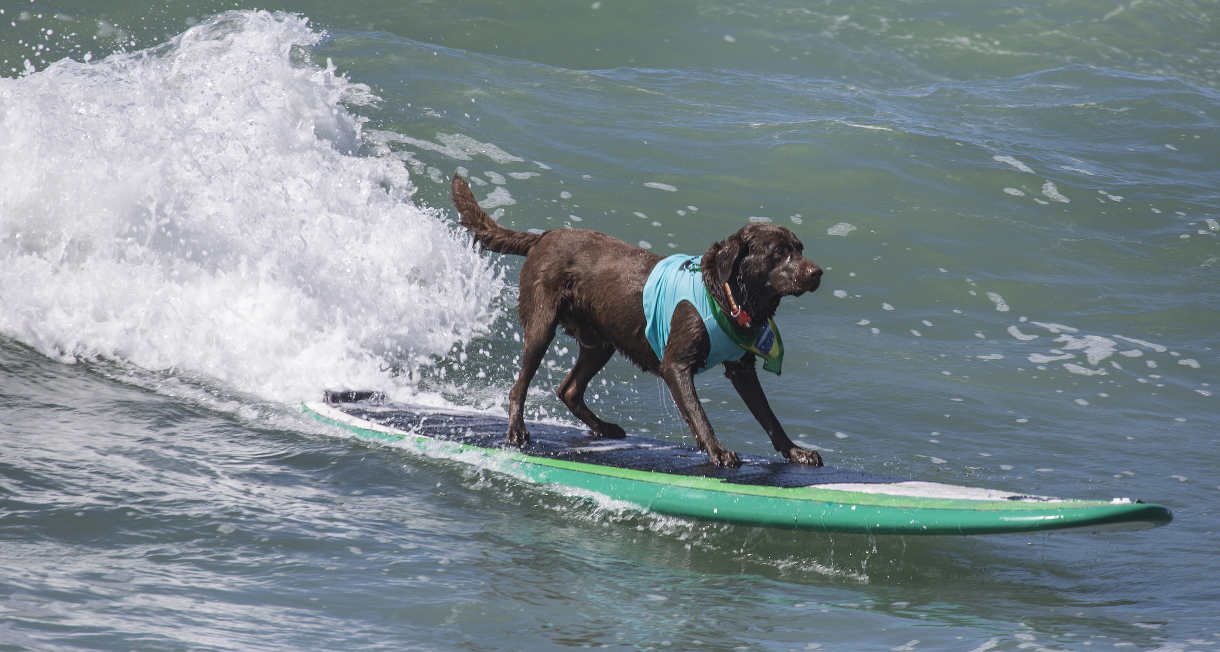
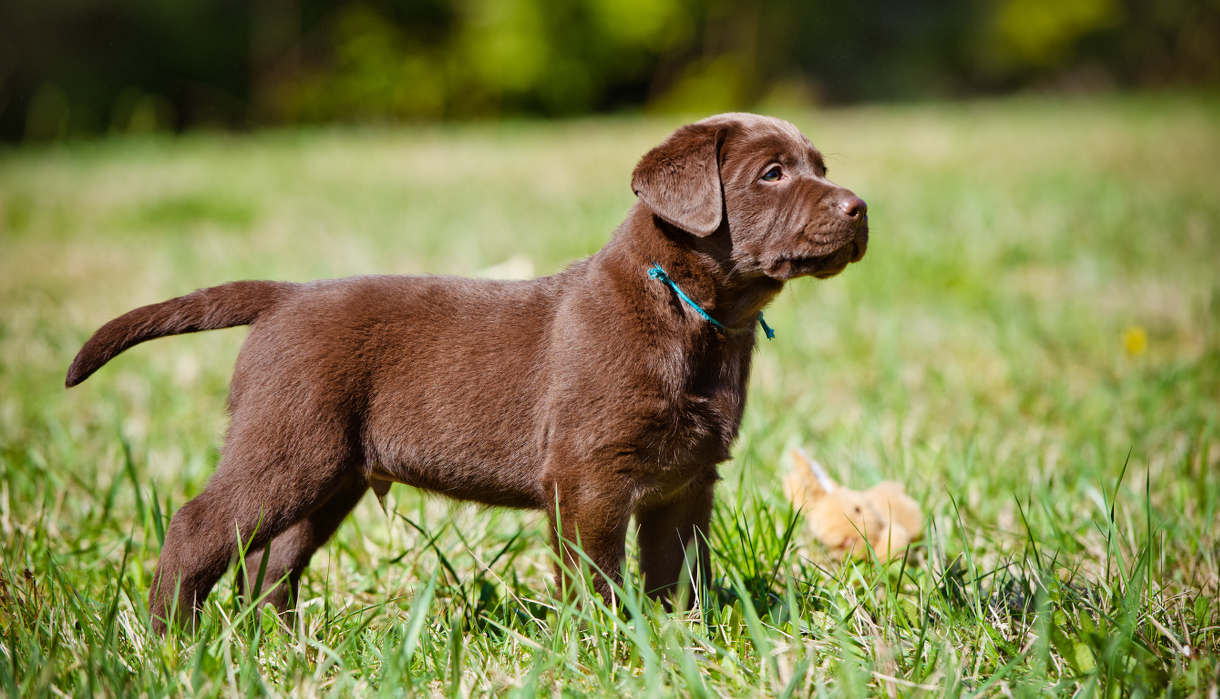


I have just rescued a chocolate lab mix that was abandoned in my neighborhood she had been vetted now she is very attached to me we have a yellow lab mix also a rescue
They growl at each other but ok through glass
I am afraid they will attack each other but neither are aggressive
Dogs
It is early days Zi am hoping this will get better
Both are incredible dogs yellow is male and fixed she is not
Thank you so much for this amazing article.
I’m walking my friends’ two chocolate “English” labs and have fallen in love with them. In fact, we plan on getting two dogs in about a year or so. I originally wanted a chocolate lab and a long hair golden retriever. We’ll see.
You’re right about the English being a bit different than others. They have more personality, at least to my eyes. They are also very different from one another. The “goofy” aspect is there but the overall open is playfulness with a mind of its own. They are both very intent on smelling every other dogs’ trace.
I can’t imagine having a life without a chocolate lab anymore. I’ve had a lot of big dogs but this is ultimately the archetypical dog I picture in my mind.
Thanks again,
I have a 3 year old female chocolate Lab. We raised her from a pup. She is the most loving, affectionate dog we ever had. She sleeps between us on our king size bed. We named her Bear, because she resembles a brown bear in the face. She loves to play all of the time, I’ve got bruises to prove it! Anytime is playtime for Bear.
I have a male two year old chocolate lab. He loves socializing off-leash with other dogs. However he is extremely leash reactive. When he sees another dog on a walk he goes crazy such as lunging, barking, etc. He looks aggressive to other people on the walk but he actually is friendly to everyone. I have tried several training techniques but nothing has worked. I was wondering if this is common in chocolate labs
I have chocolate lab named Echo. She is my every thing. She loves to play every time. But i am conscious about her health. She needs more care.
My papa is getting a chocolate lab is a few weeks.
Hello Pippa, I thoroughly enjoyed your article. I have had numerous Labs over the years but my chocolate Kenda is my favorite and she has lived longer than any of them. She will be 15 in May she has had ear infections from time to time and she has to get an allergy shot mainly in the summer. Now she has a prolapsed larenyix which makes it difficult to breath especially when it is hot. We also have an 11 year old Black, a 10 year old Fox Red, and a 3 year old Yellow that my son bought my daughter for Christmas after her Yellow had to be put to sleep on Thanksgiving day because of spleen cancer. All of them except the 3 year old have lumps. I was looking at Osman Labs website and found that they just got an English Chocolate to add to their breeding line. It will be a couple of years before she has puppies which will give Kenda plenty of time for extra love and attention.
Nestle was my first chocolate lab. We bought her from a breeder in a Wal-Mart parking lot 9 years ago. I would never advise someone to do that, but I am glad we did for our Nestle girl.
When we got our little puppy home, we noticed she couldn’t really walk (which I didn’t notice in the parking lot bc I picked her up right away and loved all over her and didn’t even think about watching her walk around).
It turns out, she was a swimmer puppy and the vet said they didn’t expect her to live past 12 months. They said most people would euthanize swimmer puppies, but they gave us a couple of therapy exercises we could try and wished us luck.
When we called to complain to the breeder about her condition, he offered for us to trade her in or he would give us our money back to go towards the vet bills. Knowing someone else may not put the time into rehabbing her, we got our money back and went right to work with her therapy. We cut holes in an old t-shirt and hovered her over a bathtub full of water so she could “swim”. We got soaked, but it was totally worth it when after just a few days she started walking.
My boys were 2 at the time, so they grew up together! She loved them fierce and they loved her fierce. I remember a time when I was driving around with my windows down with the boys in their car seats, and Nestle up front. We stopped at a red light and a stranger started to approach our car attempting to talk to the boys in an intoxicated manner, and Nestle propped her upper body out of the window, her hair raised and she started barking and growling like she could’ve ripped his throat out (the first and only time I saw aggression out of her, and I welcomed it at the time). He put his hands in the air like “ok ok” and started backing away. She was protecting her family!!
We worked with her in our backyard showing her the boundaries to what was HER space. We never had a fence, and never needed one. Without a shock collar or electric fence, she learned the yard boundaries and could be let outside without supervision. She would sit at the edge of the yard and watch the yard men work next door. She would also sit at the edge of the yard and watch the neighbors come home (who loved her too) and she would stay right where she was until they invited her over, then she would run over, get loved on, and when they told her to “go home” she came right back to her yard.
If the boys wanted to go play in the woods, they knew they had to take Nestle so she could protect them.
She loved to swim, and would play fetch with any kind of ball for hours straight if you would let her. She loved “fishing”, although she never caught one, and she loved to go for rides. She even knew “want to spend the night with Nana” which resulted in her bolting to the garage door and looking back and forth between my mom and the door cause she knew she was going for a ride and to spend a few days with my mom. It wasn’t because we were going out of town or anything, my mom just loved having special time with Nes and Nes loved my mom!! Mom even loved taking her trail riding and hiking in the woods with her because she felt protected having Nes with her, but also because she liked to show her off as the only pup in the group that didn’t need to be on a leash.
She was a calm cuddler, spending her time either next to us on the couch, at our feet, or in the bed with us. When my husband would go to work, she would move into his spot with her head on his pillow and sleep in with me no matter how late I slept.
My baby girl had to be put down this past Sunday at the young age of 9, but from what I read in this article it sounds like we don’t get quite as much time with our chocolate babies like we might with the others. She was doing great one week, and the next she stopped eating, her gums went white and she was running a fever. She had been to the vet twice within 2 months, but no one picked up on the very aggressive spleen cancer wreaking havoc on her body. The vet said it’s hard to detect and even with blood work, doesn’t always show itself until it’s too late, but she assured us there was nothing we could have done differently as spleen cancer is one of those genetic predispositions common to labs.
We weren’t given many options – either an extensive surgery to remove the spleen, which she might not make it through, and if she does, it would only extend her life around 6 months, but that would have been with chemo so her quality of life would have been horrible dealing with nausea and vomiting and feeling weak. Instead, she went in peace with her 5 humans (my mom included who was one of her favorite people).
It’s been one of the hardest things I’ve ever dealt with, but we loved her 1000 times over, and I know she felt that all the way to the end.
Get a chocolate lab!! They are the most loyal, loving, beautiful, graceful, patient, affectionate, smart and protective pups out there!!
Our first chocolate lab, Woody, was given to us by the breeder after we kept him at our home when they went on vacation, back in 2006. He was the runt and very spoiled upon arrival, only to be more spoiled as the years went by. His litter mate was right down the street and those 2 were never apart for very long. Long story short, our friends got a divorce and we got their dog, Camo. We had Woody and Camo for 10 years (Woody was an only dog for 2 years and Camo out lived Woody by just over a year). Both male dogs were very sweet, smart and goofy. They were both so well behaved, we took them everywhere we went and got comments about their behavior. Our girls’ favorite memory of these guys was that they pulled them up and down the street on their Wiggle Racers. I was also able to walk both of them as I rode my bike through the neighborhood – everyone knew who I was by those two labs who trotted beside me on my bike. We lost Woody to multiple organ cancer when he was 12(2018) and Camo to old age at 13 (2019). We got Jesse, female chocolate, and she was able to have a friend in Camo for about 10 months. She by far is much more goofy than our previous 2. She is very sweet and eager to please. She has tons of energy and keeps us out walking twice per day – perhaps it is more of that we forgot how much energy a puppy has, but it is welcomed. We take her camping – she has a fear of the water (she fell into my friends pool), but will ride in my kayak and loves to go hiking with us. Still working on obedience commands (she is a puller). I will always have a chocolate lab, I love their personality and there is just something about the color.
Hello Pippa,
Funny I had originally wanted a white English Labrador as an ESA for my daughter but due to circumstances we ended up with an American chocolate. I had read all those goofy websites and worried I had a crazed “dumb” dog on my hands. Soda has been everything opposite and more! Yes she has a strong retriever instinct and watch out birds! But her temperament is sweet and could not be friendlier. She is smart, funny and totally in tune with her surroundings. If her walk is delayed, she simply waits quietly for me to finish my project. She is trained with both voice and hand commands. She even earned her CGC at 10 months! A delight in our life and a huge help for my daughter.
Pippa. I remember reading somewhere, when we got our Kahlua, choco lab
About the , longer hairs ,whip looking at the end of the tail and what it represents. Can you refresh my memory I can’t find it anywhere
Our beautiful American style chocolate Kahlua had 9 chocolate puppies
Aug 31/19
We bred her at home with a friends english style chocolate
The puppies are stunning.
7 out of the 9 are staying in Revelstoke where we live so it will be wonderful to see them grow and see what their physical characteristics will be, having the mixed parents
It was a good experience. No regrets but we won’t do it again. No need, and a lot of work. Kahlua is doing great and was a class A mom.
Can I send you a couple of pics
This is a wonderful article and I appreciated the part about “proofing”. I have a chocolate American Lab and she seems so much more intense than my friend’s yellow and black lab that came from the same kennel. At first I thought it was something I was doing in her training, except I feel that she seems to be progressing pretty good for a 16 month old. I finally realized that it boils down to the job I assigned her, which is to be my athletic training partner, and so she spends a lot of time going 8-15 mph while leading a mountain bike.
I also worried about the overfriendly part that didn’t seem to exhibit itself in so many other dogs. Only once did it create a problem with an aggressive dog who drug its owner down a trail to attack us, but I am still aware of a lot of people who may not like a high powered dog bolting at them. We keep working on it and this article kinda makes me feel like we can get there someday.
That said, I love my Java. I know my husband wanted to train her as a hunting dog. And he gets jealous that she will retrieve dead bunnies and birds as “gifts” when we are out biking. But I think he is often overwhelmed by her endless amount of energy. I am hoping that he gets an English chocolate lab because I think he will enjoy a more mellow breed even though he loves Java as much as I do.
Thanks for the article.
I found your blog very helpful. Sadly I had to put my chocolate lab named Razer down yesterday. He would have been 11 years old in October. He was my best friend and I am missing him dearly. I wish he would have been with me longer but he had oral cancer and was starting to feel pain. I promised myself that no matter how much I wanted him to stay I would not let him suffer. Do you think it is too soon to start looking for a new chocolate lab puppy or do I need to give my heart some time to heal.
😢 My heart goes out to you. Only you, and you alone can answer that question. One’s beloved dog, can never be replaced, but the joy that lab pups have are infectious and their joy becomes your joy again! 🙂
2 of the people that took one of our pups mentioned above , lost their dog and only weeks later said yes They had all this Love still bubbling up and no pup to give it to. So…… there ya go. Joy joy joy
I just read your article and thanks for all the info. We never had a lab growing up, we always had heelers. About a year and a half ago, we got a chocolate lab from a friend. My daughter absolutely loves Finn. He is one of the biggest labs I have ever seen. He’s 100lbs of the sweetest dog ever. He is so gentle with my daughter. He is 4, and chews like a puppy. It is so funny to see him carrying his chewy in his mouth like a cigar. He will bring me shoes he finds in the floor, I take them and tell him thank you. I will definitely enjoy having a chocolate lab in our lives.
Hello,
I have a Chocolate Lab and his name is Mr.YOGI.
Since childhood he’s been suffering from skin problems every now and then. He is 10 months old now and every week there is a new skid problem that occurs.
He is smart and very hyper friendly.
I seek for your help to know how to get rid or make his skin problems less than what it is now.
Your reply and your suggestion will hold a value for me and yogi.
Thank you very much.
Hi
We have a wonderful 10 year old American Chocolate Lab….smart as a whip. cunning and a weasel to boot….her lineage has been able to eliminate “displacea” (sp) but we have had to replace both of her back knees due to ACL problems…the vet blames these Chucket balls that hit and go 90 degrees….and the dog does the same which is not good, it’s like hockey players that do the same thing and blow out their ACL. still wouldn’t trade her for anything…….would it be a good idea to get another pup while my Orla is still alive or wait till she’s gone?????
Jagger is our year and a half Male that is a complete joy he was the ru y of litter bust his dameaner is grand.very loving and loyal he loves helping with yard work car rides and a devoted family member and is a bird hunting fool after putting our female down over 6 years ago we definitely had a void that has been filled and recommend A lab to anyone who has the time and space they need and they will reward you generously
Hi Pippa, regarding the explanation regarding the genes.. of a black lab Bb mates with another black lab Bb only a quarter will end up brown
BB = black, Bb=Black, bB= Black and bb =
brown
Why chocolate labs don’t live as long as other retrievers?
We had the most incredible family/pet experience in our lives after we brought Charli into our family, our little girl (Chocolate Lab) to share the years we had together. When it was her time we consulted with professionals and they agreed, it tore our hearts out. We miss her every day.
At that time we decided that we would not have another dog. It has been almost two years and we came to the realization that we need a dog.
Two weeks ago we paid a deposit on little Ruby, a two week old female Choc. The adventure continues…
Loved your article was very informative i can see your love of labs a specially chocolates So i have a 2yr old chocolate named delilah she is from a breeder of english and american choclate labs her dad is big as a horse but they call him yogi the bear biggest lab i seen delilah takes after her father she loves to retrive run like crazy but her size dosent allow her to be so athletic she 98lbs strong like a moose i love her to death her breeder is a duck bird hunter claims yogi is the best retriver he ever had deliah loves finding buried objects everywhere toys in the couch when it snows she finds toys buried in 3ft of snow she loves eating snow aswell but she has that laid back lazy sleeping attitude so sometimes its hard to get her going but i love her soooo much i know you can relate
Thanks Pippa, interesting and informative article (as always).
I have a pair from the same litter, one black (M) the other choc (F).
Mainly field/american I suspect but some show traits, and full pedigree, builds on the lighter side.
She is certainly smarter, plus thinks she’s human, eg sits in chairs and carries his lead!
Though the black is more a retriever, loves balls and fetch in water or on land, he knows he’s a dog basically.
Both great house dogs, he’s more overtly friendly (people and dogs), but she’s deeper and gets upset when he gets all the attention.
If asked to describe the (rescue) chocolate I had from 2006 to 2017, I would say:
Devilishly handsome
Fiendishly smart
Stubbornly defiant
Powerfully athletic
Doggedly loyal
Decisively food-motivated
Painfully missed
You were the chocolate I always wanted, “Buster Brown.” RIP
So happy you had that many years with him. Obviously very loved! Thank you for sharing those words!
Really enjoyed your Articles . I Have owned both Black and Chocolate both English and American. I must say the color seems to be a difference in personality . My Black Lab who lived to ripe old age of 16 was never on a leash . He would even follow my kids to local store 3 miles down the road and wait outside for them he was like a human . Then my youngest wanted a chocolate and when i broke down i realized they are cute as can be but he was a bit harder to house train. He is a fantastic retriever but other then that well lets just say he is a card. The Chocolate I have now same . Harder to house train great retriever never sleeps LOL . Cat Naps with his ball . I know bomb squads shy from them for same reasons. I noticed there really isn’t many chocolate Labs in Police departments. However Nothing like a Lab for a Family pet . They will keep you from becoming a couch potato and give you unconditional love till the day they die. Thanks again for a very nice site.
Hello, Pippa. I was delighted to discover your site, and read all about lovely Rachel.
After breeding and loving black labs for 15 years, we became the owners of a very athletic and energetic chocolate lab named Duke, aka ‘the little brown bunny’.
We are Duke’s fifth home. He was a bit of a problem child, and no one could deal with him. When he wasn’t obsessing about the little yellow tennis ball, he was fighting other dogs.
Our elderly mamma lab set the rules and established a firm pecking order. Rule #1: she was THE boss. She was loving, kind, and incredibly wise….and took no crap from anyone, much less the 14 month old problem child.
Her son who (definitely purebred) was freakishly huge at 170 lbs and standing 42 inches tall, didn’t like Duke. At all. The snarling and snapping of teeth was enough to drive us crazy….thank goodness Duke was in his private ‘apartment’….a 14’x 20′ chain link pen with 5’ high walls.
The last year, after mama had passed, Her son and Duke became inseparable and loving. He passed two months ago, and Duke is now a house dog and the biggest spoiled baby you’ve ever seen.
It’s taken tons of love, patience, broken bones (mine), and dedication to bring this dog around to where he should be. Are chocolate labs stupid? Absolutely NOT. They’re probably like my Arabian mare….smarter than the people around them.
Totally worth it though.
Hi Pippa I have just been reading the information on chocolate labs as I have one called Oscar. The information is so true. Oscar is nine now. He is so lovable. He is very bright and has learnt many things from our other dogs we used to have. Sid he was a crossbred and learnt to beg, Oscar can do it really well. He has his stubborn times when he wants to meet another dog. He sits down and won’t move. It does make me laugh, he is like a child being stubborn. He loves his soft toys. He will play with them and then lick them clean like our other dog Sid did.I know he misses his best friend Lucy she was a black lab. Lived until she was thirteen. They used to always play together. Play fighting or their best game was tug of war with their toys. Lucy was from the Rspca. She is highly missed and always be in my heart and Oscars to.
In January last year I wrote about my experiences of 2 chocolate & 1 yellow labrador…. sadly the moment I dreaded happened this morning when I had the last of the three, my mad chocolate lab Muddy, put to sleep. She celebrated her 13th birthday in May and I knew time was limited but she continued to appear to be bomb proof, her diabetes continued to be somewhat haphazard due to Muddy’s ability to sniff out food at 40 paces & to time her demolition of it to the second of my back turning. She had a cauliflower ear due to scratching & carried the very uncool protective hood with dignity. Muddy spent many a happy glucose curve day at the vet’s where she became a member of the team sitting under the receptionists’ desk.
But 2 weeks ago she developed a cough & then gagged with it, we had a provisional diagnosis of kennel cough & had 10 days of antibiotics to no effect. She slowed up dramatically, I realised she wasn’t following me everywhere, she started to get a little disorientated and panicked when she had ‘lost’ me, but her breathing became the most worrying aspect, it was laboured, sounded like a child with whooping cough & then like an asthmatic. Mud stopped eating, she actually sneered at a titbit of chicken when I offered it to her, but she drank & drank. The vet did a variety of tests & was of the thought that this was either cardiac failure or more sinisterly a cardiac tumour.
Last night i slept downstairs with her as she couldn’t manage the stairs. This morning she could barely stand but still wagged her tail, albeit half heartedly. We were referred to a specialist who confirmed a cardiac tumour. My son & I decided there & then to put her out of agony, my 6’1″ 18yr old son broke his heart (on the day he achieved his dream to go to the Uni of his choice) we stroked & thanked Muddy for her devotion, unswerving, undemanding & unconditional love as the vet administered the drug. Muddy looked at us through her milky cataract eyes & thanked us, she lowered her head & quietly slipped away.
My best friend has gone but she, like the others, will never leave us emotionally, I hurt, I am crying as I write this but as we all who own pets know we will all go through this pain at some point, but the company, love & sheer joy that pet has given us far outweighs this loneliness.
I wasn’t looking forward to my youngest son leaving the nest in October, I am looking forward to it even less now as my home will now be totally empty without Muddy there at the door welcoming me home from work, lying in the most awkward of places whilst I cook or keeping me warm by lying on my bed in the bleak mid winter.
Get a chocolate dog, they are fabulous companions.
Muddy, I love & miss you but you’ll always be in my heart, thank you for being my friend for the last 13 years.
This is absolutely so beautiful and heartbreaking. I’m in a puddle of tears reading this whilst holding my sweet 8 week old chocolate lab puppy Coco. It is true as you say, the sheer joy they bring to our lives is so worth it all. I know your dear Muddy is waiting to give you kisses on the other side.
Thank you for reading my post & for your kind comments. At least once a day I think of filling the void with another dog but circumstances have changed:I work & am out the house from 0830-1900, my mother, who used to oversee the dogs during the day, is now immobile, deaf & going blind… so it would be ridiculous of me. But I am hugely jealous of you having a choc lab puppy, enjoy her, hold her, play with her, but above all love her, because you will be rewarded immeasurably & unconditionally.
I do understand. Our little chocolate joined our family 9 1/2 years ago. Preceded by Penny (yellow) Jessie (black) and Daisy (yellow) she deceived us at first into thinking she was a quiet retiring g Labrador puppy – unheard of! By her first birthday her true personality started to emerge. Highly intelligent, athletic, a gardener (actually removed pitted lavender from a sitting in a retainer wall in the garden, dug a trench just
Like our gardener had done the day before, and placed the pots in it several inches apart!!) fun loving, highly affectionate, adored Hunan company but especially my youngest son – she would sit quietly by his feet as he practiced his classical trumpet repertoire while at the Conservatorium of Music – she quietly melded into our family. She mopes when my husband goes overseas but welcomes him home enthusiastically, loves it now he has retired and takes her in long walks. Lately she has slowed and takes the occasional rest in route just sitting quietly, she is, of course, in charge. Has the ability to sense the exact time to help herself to a sandwich portion from your plate while you return items to the fridge and sits there without a crumb of evidence but you know there were 4 sandwiches not three!! She
Likes to go to bed at 8.30 each night (that is lights out time at the luxury boarding kennel she visits occasionally) and will come over to me and give me a hug and kiss and then walk towards the laundry – so well trained are we. I know that there will be a large chocolate paw engraved in my heart forever. The other girls were beautiful loving companions but Lucy? She is the most loving caring companion one could ever have
We trust she will defy the research and live to a ripe old age.
Me and my wife have recently became owners of a chocolate lab puppy. We guessed his age to be 4-6 weeks old. He actually has his first vet appointment tomorrow. About a week ago my wife was driving to a friends house about 30 min away from us. She watched a truck turn out of a chemical plant, into the left lane just in front of her, and watched as the truck plowed through a dog. She Was in the right lane and slowed down, and when she saw the dog still breathing pulled over. She was still laying part way into the road. She pulled the injured dog off the road and tried to comfort her. Another car had pulled off behind her and the other driver did what he could to help too. He brought over some water to try and get her to drink but the dog was in too bad of shape and died after about 20 minutes. My wife noticed a house off the road and went and checked to see if the dog was theirs. It wasn’t. On her way back up to the highway, she saw 2 puppies crawling out of the ditch near where the dog was hit. She had noticed the dog was very mal nourished, but had a swollen belly. She grabbed the 2 puppies and took them to her friends house, and they started to do what they could to help them. It took an hour and a half and 6 bathes to remove all the fleas. Both puppies were very under fed and anemic from the 1000’s of fleas they had. Her friend kept one (a female) and we kept the male. It’s been a rough week with him but he is finally healthy. He has had his shots and wormer cause the anemia, and has the vet appointment tomorrow.
I have a choc lab named goose sometimes he acts almost human. He always has to be touching or laying his head on you he even will put his head on your shoulder like it getting a hug he is not our dog he is a part of the family
My lab jake was like same we just lost him at 13 and a half my heart is broken.jake was like yours hugs every morning and night the most loving dog ever he also was family. Out of the time we had our jake he only spent 3 days from us and then he had a reliable sitter.
Hi Pippa, I have a 10 month old chocolate lab called Bailey who I am training to become my assistance dog. He is gentle and eager to please. He is big on retrieve and from 4 months has been picking up my crutches and other dropped items. He is now learning to open and shut the back gate and other doors. He walks well to heel on and off lead. The only issue we have is in getting him to walk past other dogs on lead calmly.He is no longer lunging at them, but just when you think hes cracked it he pulls towards another dog wanting to say hi. Not great when you are ion a wheelchair and havent had time to apply brakes.I was going to get him neutered as i had been advised this would calm things, but having read your article have changed my mind. Advice on how to deal with this would be great as he cant wear the charities officiala coat until he has cracked this last thing
Hi Pippa, Phoebe our chocolate lap puppy runs away and hides under the table when I take the harness out and it’s time for a walk. Also it’s quite hard to get get out the door. Once we are walking she loves it. I checked the harness and collar to make sure it’s not hurting her in any way and it seems to be fine. She’s 4 months now so I only take her out once or twice a day for 1 loop around the park so she isn’t too tired later. Can you advise why she hides when it’s time to go out and what can we do to get her excited about walkies? I have tried treats as well! Thanks!
Hi Sylvia and Pippa, My Sadie does the same exact thing. She does not like the harness. I pull it out and she goes running. She is 6 months old (going to be 7 months in another week) and she has not liked the harness since the first time we started putting collars/harnesses on. We have had her since she was 8 weeks old. I have tried treats as well. I hate to “man (woman) handle” her to get the harness on. Oh and then once I do get it on, she stays frozen for several minutes. Then realizes that she can move and it’s off to the races. LOL It’s quite comical but frustrating at the same time. Any assistance in fixing this situation would be great! Thank you!
Dear Pippa,
We adopted or rather my husband fell in love with a chocolate lab that a friend found with a broken leg south of San Antonio, Texas. He was impressed with the gentle nature of the dog even though she must have been in extreme pain. He only had a few minutes with her (Cocoa Bean) before the rescue scooped her up and took her to their vet. When I came home he told me that he had fallen in love and told the rescue group that he was interested in adopting the dog. We had decided no more dogs once our beloved Milo passed (he is a 17 year old very mixed breed who shows no sign of stopping) but we welcomed Cocoa into our motor home lifestyle. She is doing great on three legs even at obedience classes. We got her chipped but our main concern is that as we travel and visit all our friends one of them will keep the dog! We have been enjoying your articles. Thank you.
Hi Pippa..
Your website has been my sanity saviour these past few months.
I have a 7 month old chocolate girl: her nickname is Hurricane Gemma.
At times she is a great pup but at others a real trial.
I am in Australia & wondered with all your talk about English and American lines of dogs if Australian Labs are a whole other catergory too?? Where do our dogs fit into the picture or are they hybirds of the two dominant lines?? I would be interested to hear your views.
Gemma is our second lab and the experience to our first..a black girl named Fleur (from obedience trial lines) is completely different. Also we are somewhat older and NO child at home.
I have signed up for your weekly emails and find all the topics very relevant to my situation.
We have a long way to go and I’m grateful that there is a reliable, knowledgeable site to provide support.
Many Thanks
Gwen
Hi pippa.. I put my chocolate lab Java down a year ago last month. I rescued her at 3years old she was already almost blind. She lived to be almost 13. Not a day goes by that I don’t miss her. I will retire in a few years and adopt another. I love your articles. She was my 3rd lab. They are the best dogs ever. Even blind she loved to walk and had an amazing personality. Reading your article just made me happy.
Pippa, thanks for the article. We adopted 2 labs from someone who’s health was not good and couldn’t care for active labs. One is what I have discovered is an “American” field lab. She is a chocolate or liver. The older one was (what I was used to) an “English” black lab. I’m from the states where labs are popular both as hunting dogs and family dogs, too. My grandfather was a hunter who preferred training English labs over bird dogs. I never knew the difference in the labs (though I have learned the AKC & UK Kennel club don’t recognize the differing lineages). I grew up around English labs and thought all labs should look like them and act like them. I love my chocolate, Roxie, but I’m learning to appreciate her beauty as an American lab which i mistakenly thought were breading flaws!
Oh, and our girl Roxie is so, so clever. She plays hide and seek. I thought she was smarter than our black lab, Holly. I think, however, Holly was smart but not as energetic nor as eager to please like Roxie, the chocolate.
What a lovely Chocolate article! Thank u Pippa! We love our 8 1/2 yr old Choco, Tyson. He was adopted from the SPCA at 11 mos old, and I have recently discovered he was born at a giant puppy mill that was “busted” a few yrs ago, but seems to be “purebred”. He is a delight. Super energetic, still acts like a young dog, would swim 24/7, runs like the wind. Hates walking at a normal pace! Very healthy. And wickedly smart. He actually plans dirty tricks to get his “sister’s” toys away from her, i.e. pretends, correctly anticipates her response, then dashes back to get the toy. Anyway, we love him and are so happy he offered us his water bowl that day at the shelter.
We were lucky to have a 10 week old rescue end up with us. She also like above was a snippy little bugger when she didn’t want to do something. She has mostly grown out of it. Every once in a while she will let out a groan and an air snip( as I call it). She is VERY vocal, persistent, rambunctious, stubborn, loveable,hand chewing, constant attention needing one and a half year old.
Some times I have to send her to time out but I wouldn’t give her up for anything.
Hi there, we are picking up our very first puppy – a chocolate lab – on Friday 12 January 2018 & are super excited but nervous & apprehensive too. We have never owned a puppy before & we have been scouring the internet for tips & hints on everything. I love your web site, so much information and helpful advice. I think my main concern at present is the house training. Not that I do not want the mess etc, I am not at all bothered about clearing up after the little guy, I guess I am wondering how long it will take and how do puppies cotton on to asking at the door to be let out. Like you, I am a little biased now towards chocolate labs, but on the whole, I think the labrador retriever, whatever colour, is a fabulous looking dog & perfect for any household. Love the site & all the articles.
Glad you are enjoying the site Karen, don’t forget to join the forum https://thelabradorforum.com
Good luck with your puppy 🙂
Thank you, we have now completed our first week with our new choc lab & we think he is doing marvellously so far. We bought your book & it is a God send. Every time we wonder how we should or should not be doing something, we search for the answer in your book. I have also joined the forum & had some good replies to a question I posted. We are totally smitten with our little guy, just hope we can do him justice by giving him the love, care, attention and a forever home that he (well all dogs) deserve.
Hello, We are going to be picking up our male chocolate English lab pup in a few weeks. I’ve been reading your page and it’s great and loaded with valuable information. I did read the section on English Labs but I’d like to know how much can I apply the rest of the information on this site to English Labs? For example this section on Chocolates, biting, etc. Thank you for a great informative site. Mark
Hi Mark, The advise on Labrador training and behavior can be applied American or English Labs, or indeed any other breed of dog. Chocolate Labs tend to be from show lines, but some do have working lines too. You can find out more in the ‘English or Show’ and ‘American or Working’ sections of this article. Hope this helps! Best wishes, Lucy
We had a little girl choc lab find us ,she was starving ,so badly her butt bones were showing,we took her to the vet.,got her checked out,her hair was falling out also so blood test had to be done for making,it turned out it was from lack of nutrition., we feel in love with her on the spot,Shiloh Diamond Hannan is now a happy healthy and very smart part of the family,she brings in the news paper and takes the mail inside for my mom,she’s the best thing in our lives
Thank you for giving your little girl a wonderful home! What a touching story. Bless you.
Just read this Pippa and found it fascinating. I especially liked your comment about your dog Rachael being keen to retrieve but nit share the spoils. We have a two year ild Chocolate called Dudley. Let’s justsay he exhibits this trait too….
We have a beautiful 10 week old ‘Choccy’ Lab with pretty similar problems! Always biting and growling. Likes to show his teeth, seems to be a very snappy character! What do you suggest?
Great article BTW, keep up the good work!
This is the article you need – good luck with your puppy
The Labrador’s ancestors originated on the island of Newfoundland, now part of the province of Newfoundland and Labrador in Canada. I heard no mention of the Lab pulling in fishing nets in Newfoundland. They were named after the Labrador Sea off Newfoundland. If you ever go to St John’s, Newfoundland you will see statutes of the Lab everywhere. That is why Labs love the water. They were bred to help fishermen pull in their fishing nets. The British came to the colonies and loved this dog took it back to England and that is where it became a hunting dog while the Americans came and took it back to breed then taller and thinner. This is an important part of the history of the Lab that was never mentioned above.
True! Thank you from a Canadian choc parent.
Brilliant read! I have a 9 year old Choccie Lab named Ripple (like Galaxy ripple) she really is my best friend! I wished for a Labrador every time I blew out my candles on my Birthday for years and I my wish finally came true! She is without a doubt the most loving dog I have ever had and everyone who meets her say the same! The bond we have is that of a mother and child! She wags her tail and her whole butt shakes and she too always loves to play! Especially with her soft teddies, she chooses a different one each night to take to bed haha! She loves playing fetch with her tennis ball even at the age of 9 she has so much energy, loves everybody she meets, and she gives the best bear cuddles you could ever wish for! Training in the beginning was tough but be consistent – it 100% pays off I couldn’t be without my Ripple, I will always have choccie labs!!
We were won over by a 6 year old choccy lab in the rescue centre 6 months ago. I don’t know where we would be without him now. He never fails to make me laugh everyday, such a character I really have no clue to why anyone would have given him up. Their loss, our gain. Yes there were a couple of issues in the settling in period but by being firm and laying down ground rules for the whole family to follow he is now a very waggy tailed boy (in fact his whole body wags).
My chocolate lab Mila is 2 years old! We have always had rotties but decided on her. We got her when our rott was 4 years old. They are the best of friends.Together all the time. The one adorable thing about her (there are a million) is that she is a talker! I feel like I can have a conversation with her. I’ve never heard a dog so vocal. I’m so happy I found this website!
Very good read.
I have a 15wk old chocolate Labrador called Mason.
He is very cute and has learnt few commands but he will bite me when I stroke him, nearly every time.
He keeps getting on furniture to get cushions doesn’t understand drop but does understand ‘leave it’ command when outside.
How do I encourage him to stop being so excited when we see other dogs on walks?
Please help me loosing confidence and enjoyment
Hi there, please join the forum so that we can help you with your training/behavior problem 🙂
We have a 12wk old choc lab puppy and we have the same problems she keeps biting all the time but she now growls shows her teeth and snaps at us and she wont listen it seems her way or no way.
Hello
I have a Choc Lab she was 4 on July 21. I think your article on them is so heart warming, She is my best friend. As your Rachael she loves her soft toys. She is gently, kind, loving and makes me laugh.
The welcome when you come home, bringing her soft toys to you.
My chocolate lab, Kooky is coming up on 2 years old. She’s wonderful, full of energy, obedient , great with other dogs and children. I’ve never known a dog be so tactile, she leans against me with her full weight and lies on my feet to snooze. What would I do without her ???
Hi, I’ve a 12 week old choc lad who has started to develop silver hair growth down his back, to the point he looks like a skunk. Have you seen anything like this before or advise if it will grow out. He is a full pedigree Dad fox red Mother choc brown.